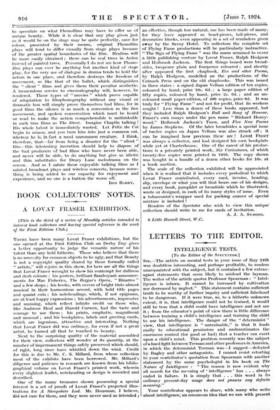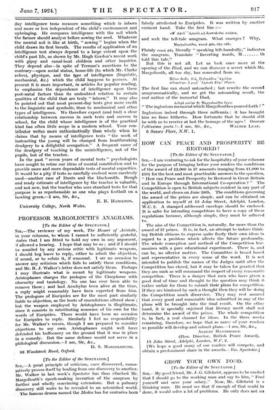LETTERS TO THE EDITOR.
INTELLIGENCE TESTS.
[To the Editor of the SPECTATOR.] SIR,—The article on mental tests in your issue of May 24th was doubtless interesting, and perhaps profitable, to readers unacquainted with the subject, but it contained a few extrav- agant statements that seem likely to mislead the layman. The writer of the article quotes Professor Spearman : " Intel- ligence is inborn. It cannot he increased by cultivation nor decreased by neglect." This statement contains sufficient truth to be worthy of further inquiry and sufficient falsehood to be dangerous. If it were true, as, to a hitherto unknown extent, it is, that intelligence could not be trained, it would still be true that a child could have intelligence and not use it ; from the educator's point of view there is little difference between training a child's intelligence and training the child to use his intelligence. The danger of the " determinist " view, that intelligence is " untrainable," is that it leads easily to educational pessimism and underestimates the enormous control (for good or bad) that a teacher can exert upon a child's mind. This problem recently was the subject of a hard fight between Terman and other professors in America, in which the determinist Terman was—I suggest—defeated by Bagley and other antagonists. I cannot resist retorting to your contributor's quotation from Spearman with another statement by the same psychologist in his book on The Nature of Intelligence : " The reason is now evident why all search for the meaning of ' intelligence' has . . . always ended in failure. It is simply that . . . this word in its ordinary present-day usage does not possess any definite meaning."
Your contributor appears to share, with many who write about intelligence, an erroneous idea that we can with present day intelligence tests measure something which- is inborn and more or less independent of the child's environment and upbringing. He compares intelligence with the soil which the farmer should analyse before sowing the seed. Whatever the mental soil is like at birth, " sowing " begins when the child draws its first breath. The results of application of an intelligence test always depend to a large extent upon the child's past life, as shown by Mr. Hugh Gordon's recent work with gipsy and canal-boat children and other inquiries. They 'depend also—in spite of Terman's assertions to the contrary—upon social status, home-life (to which Mr. Clarke refers), physique, and the type of intelligence (linguistic, mechanical, &c.) which the child happens to possess. At present it is more important, in articles for popular reading, to emphasize the dependence of intelligence upon these post-natal factors than its undoubted relation to certain qualities of the child that are truly " inborn." It may also be pointed out that most present-day tests give more credit . to the linguistic and symbolic, than to mechanical and other types of intelligence. We therefore expect (and find) a close relationship between success in such tests and success in school, for the child whose intelligence is of the practical kind has often little scope in a modern school. Your con- tributor writes more enthusiastically than wisely when he claims that by means of intelligence tests " the work of instructing the young will be changed from heartbreaking drudgery to a delightful occupation." A frequent cause of the drudgery of teaching is the unintelligence, not of the pupils, but of the teacher.
In the past " seven years of mental tests " psychologists have sought to refine our ideas of mental constitution and to provide more and more dependable tests of mental capacities. It would be a pity if tests so carefully evolved were carelessly used—another case of Dante and the blacksmith. Rough and ready estimate of intelligence by the teacher is valuable, and not new, but the teacher who uses standard tests for that ,purpose is as reprehensible as one who plays football on a bowling green.—I am, Sir, &c.,











































 Previous page
Previous page